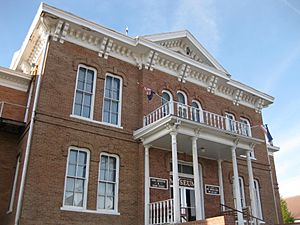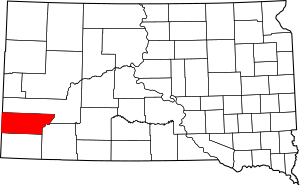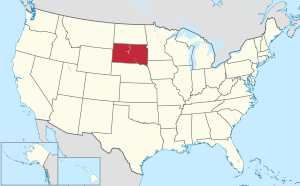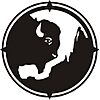Custer County, South Dakota facts for kids
Quick facts for kids
Custer County
|
||
|---|---|---|

Custer County Courthouse
|
||
|
||

Location within the U.S. state of South Dakota
|
||
 South Dakota's location within the U.S. |
||
| Country | ||
| State | ||
| Founded | 1875 (created) 1877 (organized) |
|
| Named for | George Armstrong Custer | |
| Seat | Custer | |
| Largest city | Custer | |
| Area | ||
| • Total | 1,559 sq mi (4,040 km2) | |
| • Land | 1,557 sq mi (4,030 km2) | |
| • Water | 2.1 sq mi (5 km2) 0.1% | |
| Population
(2020)
|
||
| • Total | 8,318 | |
| • Estimate
(2023)
|
9,117 |
|
| • Density | 5.3355/sq mi (2.0600/km2) | |
| Time zone | UTC−7 (Mountain) | |
| • Summer (DST) | UTC−6 (MDT) | |
| Congressional district | At-large | |
Custer County is a county in the U.S. state of South Dakota. As of the 2020 census, the population was 8,318. Its county seat is Custer. The county was created in 1875, and was organized in 1877. It was named after General George Armstrong Custer.
Custer County is home to two of the three longest caves in the United States: Jewel Cave National Monument and Wind Cave National Park.
Contents
Geography
Custer County lies on the west line of South Dakota. Its west boundary line abuts the east boundary line of the state of Wyoming. The Cheyenne River flows northeastward along the upper portion of the county's east boundary. Battle Creek flows southeastward in the upper eastern part of the county, discharging into Cheyenne River along the county's northeastern boundary line. Spring Creek flows northeastward through the upper eastern part of the county, discharging into the river just north of the county border. The county terrain is mountainous, especially its western portion. The terrain slopes to the east; its lowest point is its NE corner at 2,461 ft (750 m) above sea level (ASL). Its highest point is a mountain crest along the north boundary line, at 6,657 ft (2,029 m) ASL.
Custer County has a total area of 1,559 square miles (4,040 km2), of which 1,557 square miles (4,030 km2) is land and 2.1 square miles (5.4 km2) (0.1%) is water.
Major highways
Adjacent counties
- Pennington County - north
- Oglala Lakota County - southeast
- Fall River County - south
- Niobrara County, Wyoming - southwest
- Weston County, Wyoming - west
Protected areas
Demographics
| Historical population | |||
|---|---|---|---|
| Census | Pop. | %± | |
| 1880 | 995 | — | |
| 1890 | 4,891 | 391.6% | |
| 1900 | 2,728 | −44.2% | |
| 1910 | 4,458 | 63.4% | |
| 1920 | 3,907 | −12.4% | |
| 1930 | 5,353 | 37.0% | |
| 1940 | 6,023 | 12.5% | |
| 1950 | 5,517 | −8.4% | |
| 1960 | 4,906 | −11.1% | |
| 1970 | 4,698 | −4.2% | |
| 1980 | 6,000 | 27.7% | |
| 1990 | 6,179 | 3.0% | |
| 2000 | 7,275 | 17.7% | |
| 2010 | 8,216 | 12.9% | |
| 2020 | 8,318 | 1.2% | |
| 2023 (est.) | 9,117 | 11.0% | |
| U.S. Decennial Census 1790-1960 1900-1990 1990-2000 2010-2020 |
|||
2020 census
As of the 2020 census, there were 8,318 people, 3,794 households, and 2,552 families residing in the county. The population density was 5.3 inhabitants per square mile (2.0/km2). There were 4,837 housing units.
2010 census
As of the 2010 census, there were 8,216 people, 3,636 households, and 2,427 families in the county. The population density was 5.3 inhabitants per square mile (2.0/km2). There were 4,628 housing units at an average density of 3.0 units per square mile (1.2 units/km2). The racial makeup of the county was 94.2% white, 2.9% American Indian, 0.4% Asian, 0.2% black or African American, 0.4% from other races, and 2.0% from two or more races. Those of Hispanic or Latino origin made up 2.2% of the population. In terms of ancestry, 42.1% were German, 13.1% were Irish, 11.4% were English, 10.8% were Norwegian, and 7.9% were American.
Of the 3,636 households, 21.7% had children under the age of 18 living with them, 58.2% were married couples living together, 5.5% had a female householder with no husband present, 33.3% were non-families, and 28.4% of all households were made up of individuals. The average household size was 2.19 and the average family size was 2.65. The median age was 50.3 years.
The median income for a household in the county was $46,743 and the median income for a family was $58,253. Males had a median income of $39,194 versus $29,375 for females. The per capita income for the county was $24,353. About 4.3% of families and 9.7% of the population were below the poverty line, including 10.9% of those under age 18 and 11.7% of those age 65 or over.
Communities
City
- Custer (county seat)
Towns
- Buffalo Gap (Population: 131)
- Fairburn (Population: 60)
- Hermosa (Population: 382)
- Pringle (Population: 109)
Unincorporated communities
Townships
The county is divided into two areas of territory:
- East of Custer State Park
- West of Custer State Park
Education
School districts include:
- Custer School District 16-1
- Elk Mountain School District 16-2
- Hot Springs School District 23-2
See also
 In Spanish: Condado de Custer (Dakota del Sur) para niños
In Spanish: Condado de Custer (Dakota del Sur) para niños



